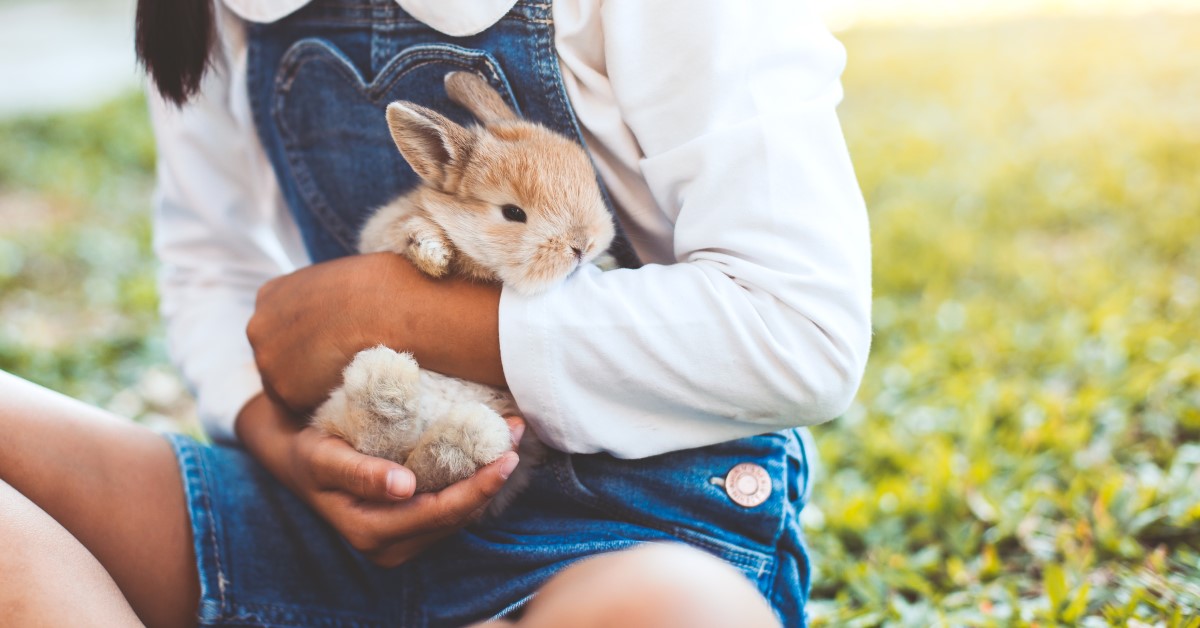Summer Care Tips for Your Pet Rabbit
Help your pet rabbit beat the heat this summer with these pet care tips.

Animals tolerate summer heat in different ways. Horses sweat, dogs pant, and lizards employ behavioral thermoregulation, in which they shuffle back and forth between shady and sunny areas. Rabbits, on the other hand, have a unique cooling method known as the “ear effect.” As rabbits don’t perspire, their outer ears act as radiators, helping to regulate their temperature by pumping blood into the ears. This summer, help keep your pet rabbit cool, comfortable, and healthy with these hot weather care tips.
Prevent Dehydration in Your Pet Rabbit
Dehydration occurs when there is a dangerous loss of body fluid, sometimes caused by sweating or not taking in enough fluids. Like all pets, rabbits require a continuous supply of fresh, clean water that will help them maintain a healthy level of hydration.
In hot weather conditions, offer your rabbit several water sources, such as a sipper bottle and a bowl. Also, include foods in your rabbit’s diet that can boost their hydration, such as fresh fruits and vegetables.
Create Shade for Your Pet Bunny
If your pet rabbit spends time outdoors in the summer, create a shady space where it can get relief from direct sunlight. A sun sail or gazebo placed over the rabbit hutch can provide sufficient shade. It’s often best to move the hutch to a place where it’s almost always shady, especially if you have a metal or wood hutch which can become very hot.
Invest in Cooling Mats for Your Rabbit Hutch
As rabbits cannot sufficiently regulate their body heat, it’s important to be proactive about keeping them cool. Consider investing in cooling mats designed for use by rabbits. Alternatively, you can place slate or ceramic tiles in the rabbit run as they tend to stay relatively cool, even in hot weather. Damp towels can also work in a pinch.
Bring Your Pet Indoors
If the weather gets too hot, you may want to bring your rabbit indoors until the temperature drops. If possible, run a fan or air conditioner to help keep your pet cool. You’ll also want to recognize the signs of overheating before the condition progresses.
Common signs of overheating in rabbits include lethargy, weakness, shallow breathing, drooling, and confusion. Some rabbits will have wetness around the nose, ears that are hot to the touch, and decreased appetite. Rabbits also tend to lie fully stretched out when they’re too hot.
Groom Your Rabbit
Similar to cats and dogs, rabbits can have too much hair. A thick or long coat can cause rabbits to become too hot in the summer, posing a potential health risk. Just like you would for your other pets, be sure to regularly groom your rabbit to remove dead or loose hair from their coat.
Clean the Rabbit Cage Often
Germs tend to spread quickly in hot, damp environments, making your rabbit’s enclosure a hot spot for bacteria. During the summer, remember to clean out your rabbit’s cage regularly.
The bedding and litter in your rabbit’s cage should be changed twice a day to prevent bacteria from spreading. Perform a deep clean of the habitat at least once a week or more often as needed.
Know the Risks
It’s important to understand the risks that hot weather conditions can pose to pet rabbits in the summer. While these critters can develop a wide range of health problems that can be exacerbated by heat, the most common hot weather risks for rabbits include fly strike and heat stroke.
Fly strike occurs when flies lay eggs in the rabbit’s fur. If left unchecked, maggots will often start to feed on the rabbit, leading to painful wounds, illness, and possibly death. As flies are often drawn to warm, wet environments such as rabbit cages, it’s important to closely monitor your pet throughout the day. Common signs of fly strike include loss of fur, a bad odor, open sores or wounds, loss of appetite, and visible maggots.
Heatstroke is a serious condition that rabbits can develop when they get too hot or dehydrated. This condition can quickly escalate, making it important to cool your rabbit off as quickly as possible. If you suspect heatstroke in a rabbit, don’t submerge them in cool water. Instead, create a breeze and set them on a cold, wet towel and gradually dampen their ears with cool water.
Freeze Bottled Water
Having access to items that are cool to the touch can help rabbits remain comfortable while in their cage or hutch. Freeze semi-full plastic bottles of water and wrap them in a lightweight towel. Place the wrapped bottles in your rabbit’s cage when the weather is hot. Your rabbit will enjoy resting against the bottle.
Offer Rabbit Food After Dark
The natural digestion process can generate heat, causing your rabbit to feel even warmer. If your rabbit tends to eat less when the weather is hot, consider modifying their feed schedule. Offer your rabbit food after the sun goes down when the air is cooler and they’re more likely to want to eat.
Keeping Your Rabbit Cool in the Summer
Summertime offers rabbits the opportunity to enjoy warmer temperatures and perhaps scurry in the cool grass. However, these animals are susceptible to heat stress, which can lead to problems such as dehydration, heatstroke, and other harmful conditions. Taking the time to provide your pet with proper summer care can help your rabbit stay healthy and comfortable, even in a heat wave.
Ready to start saving money on pet wellness care?
Then take a look at Mint Wellness, the pet wellness plan that provides fast reimbursement on routine pet care. Save on vaccinations, wellness exams, preventatives, dental, and more!
Learn More


